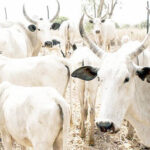The Federal Ministry of Agriculture and Rural Development (FMARD) warned Nigerians against the consumption of cow hides popularly known as ponmo, smoked meat and bush meat as a preventive measure from contracting the anthrax.
This development came amid reports of cases in neighbouring West African sub-regions such as Northern Ghana bordering Burkina Faso and Togo.
One person was reported dead after eating the carcass of an anthrax-infected dead cow in the Binduri District in Ghana while several cows had died of the disease in one of the suburbs of the region.
However, no cases have been reported in Nigeria.
What is Anthrax?
According to the Centres for Disease Control and Prevention, Anthrax is a disease caused by gram-positive, rod-shaped bacteria known as Bacillus anthracis. It occurs naturally in soil and commonly affects domestic and wild animals around the world.
People can contract anthrax if they come in contact with infected animals or contaminated animal products.
Anthrax is most common in agricultural regions of Central and South America, Sub-Saharan Africa, and Central and Southwestern Asia, among others.
How is anthrax contracted?
People get infected when spores get into the body and this happens when the spores can be activated and become anthrax bacteria. The bacteria can multiply, spread out, produce toxins, and cause severe illness.
It can be contracted by breathing in spores, eating food or drinking water that is contaminated with spores, or getting spores in a cut or scrape on the skin.
Modes of transmitting anthrax and symptoms
Inhalation anthrax: This can occur when a person inhales spores that are in the air during the industrial processing of contaminated materials, such as wool, hides or hair.
The symptoms of anthrax depend on the type of infection and can take a day to more than two months to appear. All types of anthrax have the potential to spread throughout the body if not treated and can cause severe illness and even death.
For inhalation anthrax, symptoms are fever and chills, chest discomfort, shortness of breath, confusion or dizziness, cough, nausea, vomiting or stomach pains, headache, extreme tiredness and body aches.
Cutaneous anthrax: This can occur when workers who handle contaminated animal products get spores in a cut or scrape on their skin.
The symptoms are small blisters or bumps that may itch, swelling around the sore can occur, and painless skin sore (ulcer), most often the sore will be on the face, neck, arms or hand.
Gastrointestinal anthrax: This usually occurs when people eat raw or undercooked meat from infected animals. It occurs in countries where livestock are not routinely vaccinated against anthrax and animals are not inspected before slaughter. The symptoms include fever and chills, swelling of neck or neck glands, sore throat, painful swallowing, hoarseness, diarrhea, fainting, headache and swelling of the abdomen.
Injection anthrax: This type of anthrax is common in northern Europe where people inject themselves with heroin and it is a new discovery.
Some of the symptoms are fever and chills, small blisters, painless skin soreness, and abscesses deep under the skin or in the muscle where the drug was infected.
Prevention
The first step the government took was to issue a warning against the consumption of hides as well as vaccinating animals. However, infected animals cannot be vaccinated.
Health practitioners advise a no-contact rule in preventing coming in contact with the disease and those who are involved in the slaughter, fur, wool and hides from animals are advised to take extra caution.
Treatment
The CDC notes that people who have been exposed to anthrax but display no symptoms can take certain antibiotics to prevent it from developing.
Antibiotics and antitoxins can also be used in treating those infected with the disease, vaccination has also been advised for animals at risk.
This Explainer is produced in partnership with the Centre for Democracy and Development (CDD)

 Join Daily Trust WhatsApp Community For Quick Access To News and Happenings Around You.
Join Daily Trust WhatsApp Community For Quick Access To News and Happenings Around You.


